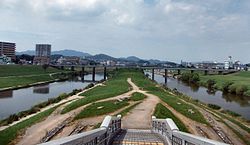Iizuka, Fukuoka
|
Iizuka 飯塚市 |
||
|---|---|---|
| City | ||

The confluence of Honami and Onga Rivers
|
||
|
||
 Location of Iizuka in Fukuoka Prefecture |
||
| Location in Japan | ||
| Coordinates: 33°39′N 130°41′E / 33.650°N 130.683°ECoordinates: 33°39′N 130°41′E / 33.650°N 130.683°E | ||
| Country | Japan | |
| Region | Kyushu | |
| Prefecture | Fukuoka Prefecture | |
| Government | ||
| • Mayor | Morichika Saitō | |
| Area | ||
| • Total | 214.07 km2 (82.65 sq mi) | |
| Population (August 31, 2016) | ||
| • Total | 130,015 | |
| • Density | 607.35/km2 (1,573.0/sq mi) | |
| Symbols | ||
| • Tree | Camphor Laurel | |
| • Flower | Cosmos | |
| Time zone | Japan Standard Time (UTC+9) | |
| City hall address | 5-5 Shintateiwa, Iizuka-shi, Fukuoka-ken 820-8501 |
|
| Website | www |
|
Iizuka (飯塚市 Iizuka-shi?) is a city located at the confluence of the Honami and Onga rivers in central Fukuoka Prefecture, Japan. The city was founded on January 20, 1932.
Iizuka was an important post-station on the Nagasaki Kaidō during the Edo Era. As Japan industrialised, Iizuka became the center of the most productive coal fields in Japan located throughout the surrounding Chikuho district. After the end of Second World War there was a large influx of people into the city as it was one of the few areas that offered a large number of jobs in the coal mines and related fields.
Since the coal mines closed, Iizuka City has suffered from a consistently declining population base. However, its proximity to both Fukuoka City and Kitakyushu City cushioned the effect of the coal industry shutdown and kept the local economy from going into freefall. Now Iizuka has a strong light industrial base and is a center for education and a rapidly expanding IT economy.
As of August 31, 2016, the city has an estimated population of 130,015 and a population density of 607.35 persons per km². The total area is 214.07 km².
On March 26, 2006, Iizuka absorbed the towns of Chikuho, Honami, Kaita and Shōnai (all from Kaho District) to create the new and expanded city of Iizuka.
...
Wikipedia


